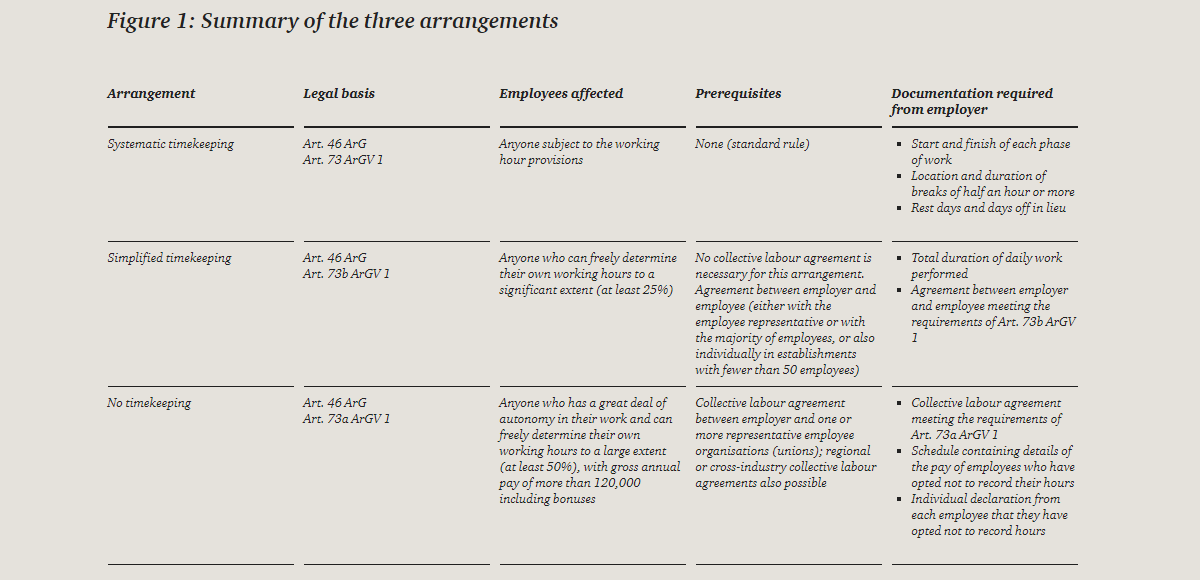The Swiss Federal Labour Act (ArG/LTr) has been in force since 1966, and is based on the Factories Act of 1877. As a result, the rules on recording working hours are no longer adequate to modern working arrangements. In recent years, many companies have failed official inspections of their timekeeping set-ups. Since 1 January 2016, new rules have been applied. They’re contained not in the act itself, but in Ordinance 1 to the Labour Act (ArGV 1/OLT 1).
To enable the Labour Act still to be modernised, we’re likely to see calls from employers, and in some cases from employees, for further changes to the law; some are already being debated in parliament.
Current rules contained in the law
At the heart of the Labour Act are measures designed to safeguard the health of employees. The rules governing working hours should also be seen against this backdrop. However, the Labour Act doesn’t apply to all organisations. It applies unrestricted to around 240,000 establishments employing some 2.6 million people. But it doesn’t apply to many types of establishment, including establishments in public transport and agriculture, and private households (except for the minimum age, which applies to the last two). In the case of public sector bodies, the Labour Act ultimately essentially only applies with regard to the general protection of health, but not to working time and breaks. [1]
[1] SECO guide to the Labour Act and Ordinances 1 and 2, February 2016 (not available in English)
The duty to log working hours derives from Art. 46 ArG. Employers are obliged to provide the authorities responsible with the corresponding schedules and documentation to enable their compliance with the requirements to be checked. Above all, organisations must make the following information accessible and keep records for five years (Art. 73 ArGV 1 lit. h):
- Working time per day and per week, including overtime and time off in lieu, and information on when these hours were worked (Art. 73 ArGV 1 lit. c)
- Rest days or days off in lieu granted per week, provided these do not regularly fall on a Sunday (Art. 73 ArGV 1 lit. d)
- Location and duration of breaks of one half hour or more (Art. 73 ArGV 1 lit. e)
- Statutory extra pay and/or time bonuses (Art. 73 ArGV 1 lit. h)
- Beginning and end of hours worked, including overtime and time off in lieu (per day and per week) (Art. 73 ArGV 1 lit. c)
Timekeeping is unproblematic for people working fixed hours with prescribed breaks. Here you only have to note any deviations or discrepancies. You’ll find more tips on comprehensive timekeeping here (not available in English).
The requirements often don’t match the practical reality, as employers and employees want working time to be flexible. It’s no secret that many employers don’t adhere fully to the legal requirements, especially companies with employees with trust-based working hours.
New timekeeping rules
With the new rules designed to make timekeeping easier, the relatively complicated timekeeping rules laid down in the Labour Act continue to apply unrestrictedly, with violations liable to prosecution. This is a key consideration for companies deciding whether to record the working time according to the new rules or continue to record hours in detail, including all the relevant requirements – in line with the norm – or whether to introduce simplified arrangements for certain groups.
A word on the actual changes: the Federal Council has added two new articles to ArGV 1. [2] The excerpt below from the SECO guide shows the new rules in the form of a table. You can find the entire guide here (not available in English).
[2] Art. 73a ArG on dispensing with timekeeping, and 73b ArG on simplified timekeeping




